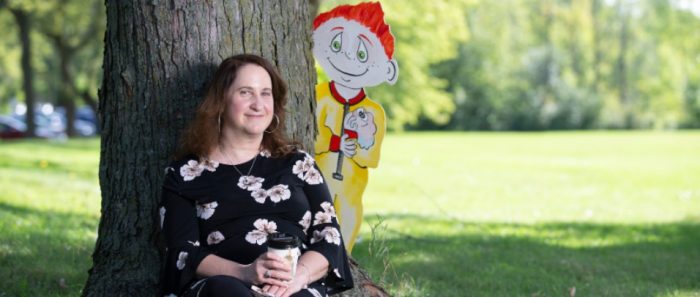Reut Gruber knows there are young people out there who just aren’t getting enough sleep.
By Philip Fine, McGill News
An associate professor of psychiatry at McGill, Gruber says there are now plenty of studies that point to sleep deficits among children and adolescents. In fact, she has been at the forefront of research in this area.
While several studies now indicate that many young people are exhibiting bad sleep habits, Gruber says little has been done to effectively change those habits, so that kids can get a longer night’s sleep and be more focussed at school.
Gruber, the director of the Attention, Behaviour and Sleep Laboratory at the Douglas Research Centre, recently reviewed a series of sleep studies and found none actually improved subjects’ sleep. “There was no real change in behaviours. Sometimes there was change in knowledge, but not in behaviour.”
With that in mind, Gruber has been designing interventions to promote healthier sleep habits in a more active way, interventions that bring on board key allies with firsthand experience of the consequences of poor sleep for young people – their teachers.
The trouble with many of the sleep studies that have been done, says Gruber, is that they do not result in children and teens learning practical lessons about good sleep hygiene. She uses the example of studies touting healthy exercise. “We all know how important it is to do physical activity. But it’s hard to integrate it into our everyday life.”
Some of Gruber’s recent work has had her recruiting educators, who have taken her findings and adapted them to their classroom curriculum. Teachers integrate healthy sleep habits through lessons that they’ve helped set up.
Gruber says she leaves the teaching to the teachers. “I’m not an expert in engaging students” at those levels, she says. The participatory aspect of the study is key, says Gruber, adding that too often researchers come into a situation where they give directives and everybody then has to follow. “The point is to really work in collaboration with your community partners.”
She says teachers and school principals were keen to design curricula around her evidence and it resulted in effective lessons tailor-made for different ages. Teachers in the younger classes employed storytelling, with one character called Sleepy Stephen, and teachers of students in higher elementary school grades taught good sleep through comic book heroes who lose their powers due to lack of sleep. Meanwhile, high school students were delivered informational content through their French classes.
Gruber knows that smartphones play a big role in youth not getting enough sleep. She says good sleep requires the ability to disengage. “In order to be able to fall asleep, we need to have a low level of arousal.” On top of that, for the body to switch to sleep mode, it needs melatonin, a hormone that is secreted when it’s dark. But smart phones not only emit light, they give children the ability to bring to bed with them “their entire street, entire social universe and entire culture.
Her health promotion interventions in the schools have so far shown positive results in improving students’ sleep habits, and she has received requests from other local educators who are interested in developing more curricula that integrates her work into theirs. “This is the vision that I had, that it will become something that the community cares about it and hopefully will be sustained beyond my research funding.”
Her next project has her working with school psychologists at both the Lester B. Pearson and Riverside school boards. “We’re trying to find a way to train the mental health teams,” she says, adding that they will become de facto sleep therapists. “If they’re trained psychologists, they’re certainly able to deliver a behavioural intervention.”
Globe and Mail | Mind your Zs: schools study adding sleep to their lesson plans
CTV | Dream class? Quebec high school introduces sleep to lesson plans this year
Global News | Quebec researchers turn to classroom to help teens overcome costly sleep woes
October 29 2019

